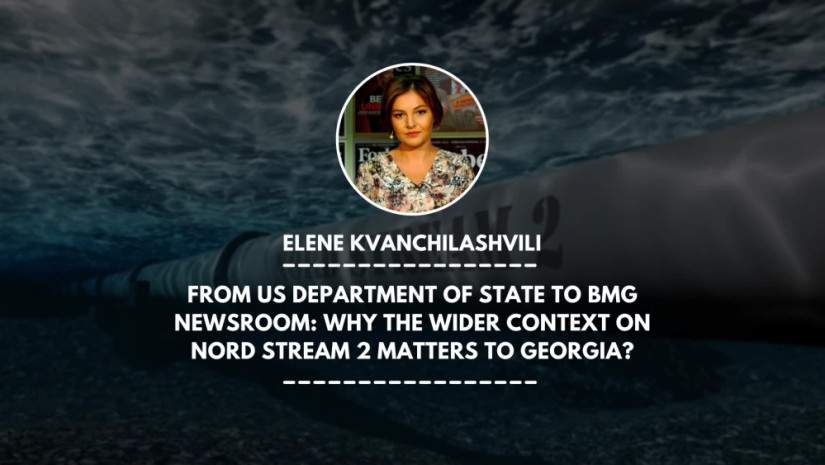Recently, just last week, Nord Stream 2 issue came up in question to Secretary Anthony J. Blinken and German Foreign Minister Annalena Baerbock at a joint press conference.
Nick Schifrin of PBS reminded Secretary Blinken his words that ‘it’d be difficult to see gas flowing through Nord Stream in the event of an invasion [in Ukraine], underlining that Chancellor Scholz has not used the same language. “Are you and the new German coalition united on Nord Stream 2?” – was the question to Secretary Blinken, followed up with the second question for the Madame Minister Baerbock: “Will Nord Stream be suspended in the event of invasion, as Toria Nuland, in fact, testified to Congress?”
In his answer, Secretary Blinken highlighted that Germany and the United States have an important agreement that had been reached this past summer when it comes to supporting Ukraine’s energy security and energy independence. “And we are working together, I think effectively, to implement that agreement, including, for example, with starting to establish a green fund that would support green energy projects in Ukraine. Concerning the pipeline itself – Secretary Blinken answered - as I said, it’s not operational, and from our perspective, it’s very hard to see gas flowing through that pipeline for it to become operational if Russia renews its aggression on Ukraine”.
In her answer, Madame Minister Baerbock asserted that Germany’s new government stipulated clearly in the coalition treaty that as far as energy policy projects in Germany are concerned – that holds true for Nord Stream 2 – European energy law applies, so in spirit and in reality. According to the Minister, this explains why the Federal Network Agency has suspended the certification process.
“We stand by the joint declaration together with the United States – underlines that Nord Stream 2 has geopolitical implications. We agreed on this, together with our European partners, that we take effective measures together with our European partners should Russia use energy as a weapon or should it continue its aggressive acts against Ukraine” – Minister Baerbock said underlining that at present, every day, every hour, every minute, Germany is doing everything it can in order to avoid further escalation, further aggressions, and a breach of international and European law.
“This is our pivotal task as foreign ministers – Baerbock added - because this has pivotal and crucial significance for Ukraine, and at the same time – and this is a component of this joint declaration and this is something that has been embarked upon at both sides of the Atlantic – it is important to become more independent when it comes to energy supply as Europeans. But also, when looking at the energy supply of Ukraine, through Ukraine, that we support Ukraine, and we need to support Ukraine to make the transition from a fossil energy supply and a fossil energy supply of Europe, and move towards a green energy supply. And this is why we have hydrogen projects and many other energy projects, Germany, but also in close cooperation with our American partners. Between the European Union and the United States of America, we have many plans and projects, and we are going to intensively deal with these projects”.
Events surrounding Nord Stream 2 project reflecting current tense Russia-European relations and its implications for Georgia have been the main topic for the BMG panel discussion with different experts in energy and renewable energy, diplomacy, and economics, summarizing 2021.
All experts agree that Russia’s capitalizing on the fact that Europe lacks unity and one firm voice to stand up to Russia’s pressure and blackmail. One more shared point on the BMG discussion panel has been that Russia is using Europe’s energy dependence on its resources for both, political and economic reasons.
What can Georgia learn from Nord Stream 2 case, looking at Russia and Europe's current energy relations?
Murman Margvelashvili, Director of WEG (World Experience for Georgia) for example says that Georgia must continue its path of reforming its energy market in line with the European rules and bring more transparency to the sector.
Murman Margvelashvili is an energy sector specialist with experience in regulation and governance, tariff setting, operation of distribution companies, feasibility studies and project assessment, privatization, energy sector planning, project management, training, and related fields. “In case of increased transparency and open market rules, Russia will lack levers to influence politicians and politics, and the healthy open competition on the market will help Georgia to pave its way towards more energy independence and security” – Margvelashvili says.
This is not, however, enough for Paata Tsintsadze, Member of Engineering and Energy Academies. Tsintadze believes Georgia should remember that its close neighbors and suppliers have their own rules which are completely different from the European standard. Tsintsadze urges that Georgia’s goal should be to minimize energy imports from Russia since in almost all cases, its energy price reflects its political rather than economic rationale. “This will only be possible if Georgia utilizes its energy potential to its fullest” – says Tsintsadze.
This is another shared position of the experts of BMG’s panel discussion – Georgia must develop its energy resources with the focus on both – hydro and other types of renewable energy, including solar and wind. “Not utilizing these resources equals treason” – says Giorgi Abramishvili, Executive Director and Chairman of the Supervisory Board of GREDA (Georgian Renewable Energy Development Association). Giorgi Abramishvili’s extensive career of over 25 years includes working in the private sector. Under his leadership, various scale energy projects were implemented (230 TPP Gardabani, 18 MW HPP Lakhami, 250KW HPP). Abramishvili acknowledges that without long-term strategic planning, Georgia will fall short of this crucial goal.
Strong political will is another main component for reaching the Energy Security and Independence goal for Alex (Buka) Petriashvili, Former State Minister of Georgia on European and Euro-Atlantic Integration. According to Petriashvili, Russia will always manipulate public opinion on developing Georgia’s own energy resources with its misinformation and disinformation campaigns. “Energy is one of the best tools for hybrid war in Russia’s hands” – Petriashvili believes.
The last clear message that Russia got on it raising issues of European security in both, public statements and the documents that it puts forward was on that press conference that we have mentioned earlier and came from Secretary Blinken.
“Let’s be very, very clear about this: NATO did not invade Ukraine; NATO did not invade Georgia; NATO did not position forces in Moldova against the will of its people. Those are all things, among many others, that Russia has done in recent years. Over the past two decades, it is Russia that has invaded neighboring countries; interfered in other countries’ elections; used chemical weapons to attempt to assassinate opponents of the government, and done so on foreign soil; violated international arms control agreements; pulled back from confidence-building and transparency measures long agreed.
And so we and our allies will absolutely be raising these and other issues with Russia in the days and weeks ahead - Secretary Blinken reiterated at the Press Conference - "Russia has concerns. We will listen. We have concerns, and it’s imperative that Russia listens”.















